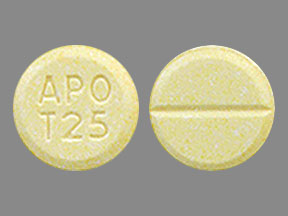
Tetrabenazine Coupons & Savings Card – Discount Prices from $88.70
Generic for: Xenazine
Tetrabenazine is a medication prescribed to manage chorea, which are involuntary muscle movements associated with Huntington's disease. While it does not cure the disease, it can significantly reduce these movements, allowing for greater participation in daily activities. Tetrabenazine functions by inhibiting a protein called vesicular monoamine transporter 2 (VMAT2) in the brain, leading to a decrease in the release of certain chemicals such as dopamine, serotonin, and norepinephrine, which are linked to nerve and muscle function. It is important to note that tetrabenazine may interact with other medications, so it should be used under the guidance of a healthcare professional.
Our coupons are free to use. Before paying, show the pharmacist your Tetrabenazine savings card to get your free discount. Use our filters below to edit the prescription box to match your needs. The Tetrabenazine prices will update based on your prescription needs. Above our Tetrabenazine coupons, you can change your location to see pharmacy prices and costs in other areas. We're here to help you buy Tetrabenazine at the lowest price with our prescription discount card.
My prescription
Edit
25MG, Tetrabenazine (60 Tablets)
Select pharmacy

CVS
$7897.27
COUPON PRICE
Albertsons
$88.70
COUPON PRICE
Walgreens
$93.00
COUPON PRICE
Walmart
$7262.53
COUPON PRICETetrabenazine savings card
Show this card to your pharmacist
Albertsons
$88.70
BIN
ID
PCN
GRP
019876
LHD67F9B10
CHIPPO
LHX
Powered by
Tetrabenazine is a medication prescribed to manage chorea, which are involuntary muscle movements associated with Huntington's disease. While it does not cure the disease, it can significantly reduce these movements, allowing for greater participation in daily activities. Tetrabenazine functions by inhibiting a protein called vesicular monoamine transporter 2 (VMAT2) in the brain, leading to a decrease in the release of certain chemicals such as dopamine, serotonin, and norepinephrine, which are linked to nerve and muscle function. It is important to note that tetrabenazine may interact with other medications, so it should be used under the guidance of a healthcare professional.
Our coupons are free to use. Before paying, show the pharmacist your Tetrabenazine savings card to get your free discount. Use our filters below to edit the prescription box to match your needs. The Tetrabenazine prices will update based on your prescription needs. Above our Tetrabenazine coupons, you can change your location to see pharmacy prices and costs in other areas. We're here to help you buy Tetrabenazine at the lowest price with our prescription discount card.
More prescriptions for Huntington's chorea
coupons from$5025.68Save 22%
coupons from$88.70Save 99%
coupons from$10051.23Save 30%
coupons from$7787.16Save 17%
More prescriptions for Huntington's chorea
Austedo Save 22%coupons from $5025.68
Xenazine Save 99%coupons from $88.70
Austedo Xr Save 30%coupons from $10051.23
Ingrezza Save 17%coupons from $7787.16
Tetrabenazine dosage forms
Use our Tetrabenazine 12.5MG coupon with prices from $62.04 for 60 Tablets. You can also use our Tetrabenazine 12.5MG coupon with prices from $102.81 for 112 Tablets. We have a Tetrabenazine 25MG coupon with prices from $88.70 for 60 Tablets. You can use our Tetrabenazine 25MG coupon with prices from $152.58 for 112 Tablets.
Dosage Quantity Price from Per unit 12.5MG 60 Tablets $62.04 $1.03 12.5MG 112 Tablets $102.81 $0.92 25MG 60 Tablets $88.70 $1.48 25MG 112 Tablets $152.58 $1.36
| Dosage | Quantity | Price from | Per unit |
|---|---|---|---|
| 12.5MG | 60 Tablets | $62.04 | $1.03 |
| 12.5MG | 112 Tablets | $102.81 | $0.92 |
| 25MG | 60 Tablets | $88.70 | $1.48 |
| 25MG | 112 Tablets | $152.58 | $1.36 |
